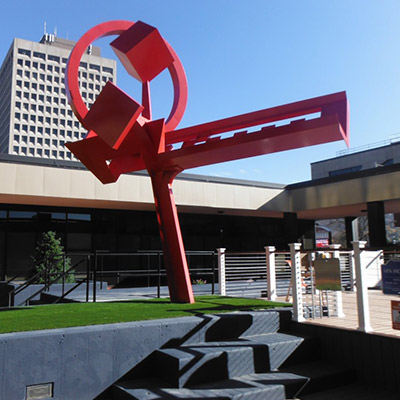By George Basler
A poll by the British Royal National Theatre named Waiting for Godot the most significant English language play of the 20th century. While that’s debatable, there’s no denying that it’s an enormously influential work that has gained almost mythic status since it was first produced in 1953.
The play’s significance stems from the fact that it’s an early example of the “Theatre of the Absurd,” a theatrical movement that sprouted in the wake of World War II’s destruction. The movement discarded traditional theatrical conventions and plot structures, instead emphasizing dislocated action, non sequiturs and symbolism.
Waiting for Godot was the movement’s first major success and gained international renown for its author, Irish playwright Samuel Beckett. This renown would culminate with Beckett being awarded the Nobel Prize for Literature in 1969.
Presenting this groundbreaking work is “a challenge, but we’re always ready for a challenge,” said Patrick Foti, artistic director for the Endicott Performing Arts Center and its repertory company, which will present the play this weekend (Jan. 19-22) in EPAC’s Robert Eckert Theater. Foti is directing the five-person cast.
Foti called the play “a tragic comedy where the genius of Beckett comes in.” The action takes place on a country road, near a leafless tree, where two tramps, Vladimir and Estragon, pass the time in conversation while awaiting the arrival of Godot, a man who could symbolize hope and salvation.
While the tramps engage in meandering discussions, a man reeking of power and success makes an appearance, leading a beaten slave. A shepherd boy shows up to announce that Godot’s arrival has been delayed.
“It is a tragic view. Yet, in performance, most of it is brilliant, bitter comedy. … It is a portrait of the dogged resilience of a man’s spirit in the face of little,” a release from EPAC states.
Dustin Hirthler (Estragon) noted that the play is “kind of notorious for being one of the most difficult plays in the English language” for both actors and audiences. His advice for audience members is to avoid dissecting everything the characters are saying and instead to focus on how the characters make them feel.
While the action takes place in an absurdist world, the problems that the characters face are things audiences can relate to: loneliness, growing old, doing the same thing day after day, Hirthler said.
Foti agreed that Beckett’s play is demanding for actors. “It’s all dialogue, and a lot of it is repetitious dialogue, because life is repetitious,” he said. “There aren’t scenes. It’s all one scene, and that’s difficult from the actors’ point of view.”
Matt Gaska (Vladimir) fell in love with the play while studying it in college, so he was quick to sign on to his role despite its difficulty. To be effective, he said, he and Hirthler must communicate as a team the entire time of the play.
The other actors in the EPAC production are Brett Alan Dewing, Nicholas Dabbracci and Ciaran Kane.
Foti said one reason he wanted to direct Godot is that the writing is “phenomenal.” He thinks audience members will appreciate this, even if they are unfamiliar with Beckett’s work.
As New York Times critic Brooks Atkinson wrote when the play debuted on Broadway: “Waiting for Godot is all feeling. Perhaps that is why it is puzzling and convincing at the same time. Theatregoers can rail at it, but they cannot ignore it. For Mr. Beckett is a valid writer.”
IF YOU GO: The Endicott Repertory Company will present Waiting for Godot at 8 p.m. this Thursday, Friday and Saturday (Jan. 19-21) and at 3 p.m. Sunday (Jan. 22) at EPAC, 102 Washington Ave., Endicott. Tickets at $20 ($18 for children and seniors) can be ordered at www.endicottarts.com. Details: Call 607-785-8903.




































